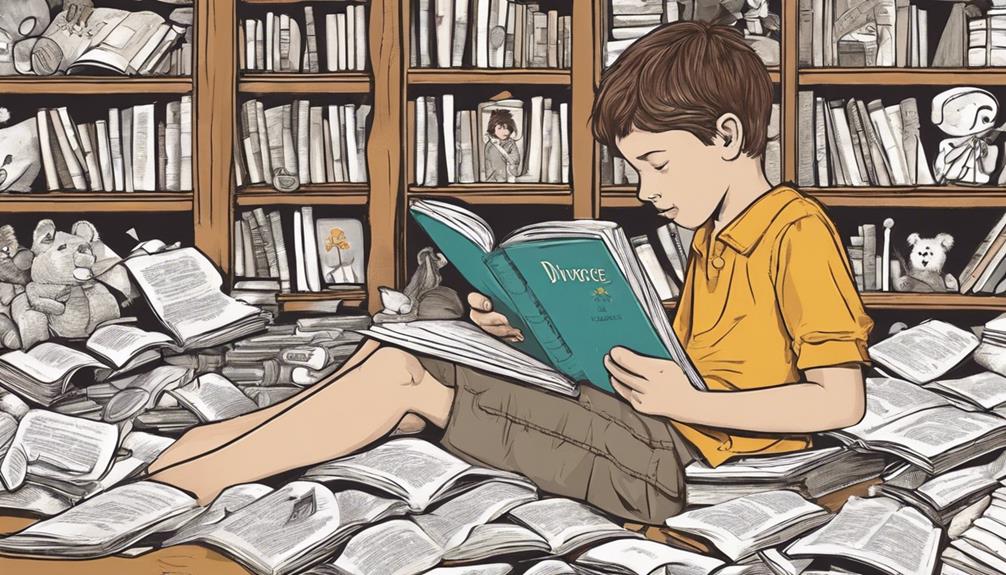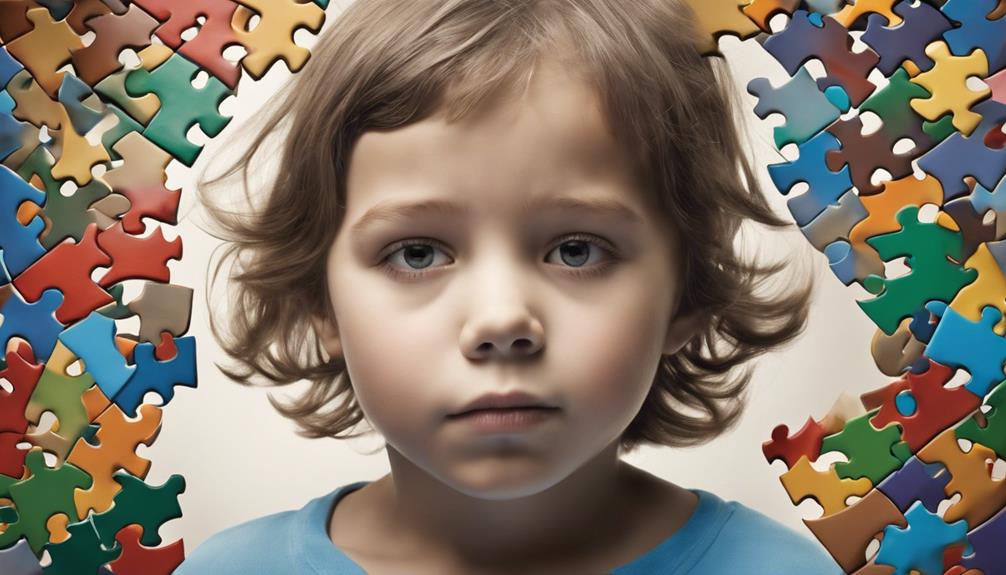Supporting Children Through Divorce
Effective Family Counseling for Divorce Support

Were you aware that around 40-50% of marriages in the United States culminate in divorce?
Divorce is a challenging and life-altering event that can have profound effects on individuals and their families. Emotions run high, and navigating this difficult transition requires a supportive and understanding environment. That’s where effective family counseling for divorce support comes in.
Family counseling provides a safe space for couples and their children to address the emotional, psychological, and practical challenges of divorce. It offers guidance on coping with grief, communicating effectively, and building healthy co-parenting relationships. With the help of competent and experienced professionals, families can heal, adjust to their new reality, and create a brighter future.
Key Takeaways:
- Family counseling provides vital support for individuals and families going through a divorce.
- Counseling helps couples and their children navigate the emotional, psychological, and practical challenges of divorce.
- Effective communication, healthy co-parenting, and emotional healing are key goals of family counseling for divorce support.
- Family counseling offers a safe space for addressing grief, anger, and other emotions associated with divorce.
- By seeking professional help, families can heal, rebuild, and create a positive future after divorce.
How Divorce Affects Mental Health and Well-being
Divorce can have a significant impact on a person’s mental health and well-being. It is a distressing life event that can trigger various emotional and physical changes. The effects of divorce on mental health are far-reaching, often leading to short-term symptoms of depression, anxiety, and increased stress levels. Individuals going through divorce experience a grieving process as they cope with the loss of their marriage.
In terms of mental health, the emotional toll of divorce can be overwhelming. Feelings of sadness, anger, confusion, and uncertainty about the future are common. Individuals may struggle with self-esteem and self-worth as they navigate the challenges of separation.
Additionally, divorce can impact a person’s ability to build and maintain healthy relationships. Trust, which forms the foundation of relationships, may be shattered during the divorce process. This can result in difficulties in forming new bonds and being emotionally intimate with others. The fear of experiencing another failed relationship may also hinder individuals from fully investing in future romantic partnerships.
The effects of divorce on mental health can be even more significant when children are involved. Parents may have concerns about the well-being of their children, creating additional stress and anxiety. Co-parenting challenges and conflicts can further exacerbate the emotional strain, affecting the mental well-being of both parents and children.
“The aftermath of divorce can trigger a range of mental health issues. It’s crucial for individuals to seek support and prioritize their well-being during this challenging time.” – Dr. Emma Thompson, Clinical Psychologist
Effects of Divorce on Well-being
In addition to the impact on mental health, divorce can also affect an individual’s overall well-being. The emotional distress and upheaval associated with divorce often lead to physical symptoms of stress, such as headaches, insomnia, and fatigue. These physical symptoms, combined with the emotional toll, can further impair well-being and quality of life.
Divorce can disrupt established routines and social networks, leaving individuals feeling isolated and disconnected. It may take time to rebuild a support system and establish a new sense of community. The loss of shared resources and financial stability can also impact an individual’s well-being and create additional stressors.
However, it’s important to note that with the right support and coping strategies, individuals can navigate divorce and rebuild their lives. Seeking professional help, such as therapy or counseling, can provide valuable guidance and support during this challenging period.
| Effects of Divorce on Mental Health and Well-being | |
|---|---|
| Increased short-term symptoms of depression and anxiety | Physical symptoms of stress |
| Emotional distress, grief, and loss | Difficulty building and maintaining healthy relationships |
| Disruption of established routines and social networks | Physical symptoms of stress, such as headaches and insomnia |
| Feeling isolated and disconnected | Financial stress and loss of shared resources |
Divorce is a challenging life event that can deeply impact a person’s mental health and overall well-being. It is crucial for individuals to seek support, whether through therapy, counseling, or support groups, to navigate the emotional and practical challenges of divorce and promote healing and growth.

Concerns and Challenges in Divorcing or Divorced Couples
Divorcing or divorced couples face a range of concerns and challenges as they navigate the complexities of separation. These challenges often revolve around the well-being of their children and their own identity post-divorce. The emotional toll of divorce can lead to heightened stress and pain for both parties involved.
Worries about Children’s Coping
One major concern that divorcing couples share is how their children will cope with the changes brought about by the divorce. They may worry about the emotional impact, academic performance, and overall adjustment of their children. This concern often stems from a deep desire to protect their children and ensure their healthy development.
Navigating Co-Parenting
Another significant challenge for divorcing or divorced couples is establishing and maintaining a healthy co-parenting relationship. They may face difficulties in communication, decision-making, and finding a balance between their roles as parents. The transition from being married to co-parenting separately can be complex and require ongoing effort and collaboration.
“Divorcing or divorced couples often have to redefine their roles as parents and learn how to effectively communicate for the sake of their children.”
Heightened Emotions and Pain
Divorce brings with it a range of intense emotions and pain for both parties involved. Anger, sadness, and resentment can complicate the process of divorce and hinder effective decision-making. Managing and processing these emotions is a common challenge faced by divorcing or divorced couples as they seek to move forward in their individual lives.
Finding Healing and Resolution
While divorcing or divorced couples may face concerns and challenges, it is important to remember that there is hope for healing and resolution. Through effective counseling and support, couples can strive to address these concerns, develop healthier coping strategies, and work towards a more positive and fulfilling post-divorce life.

Special Considerations in Working with Divorcing Couples
When working with divorcing couples, couples counselors need to be aware of the special considerations and challenges that arise during this difficult time. By addressing these unique factors, counselors can offer effective support and guidance to help couples navigate the separation and divorce process.
Communication with Family and Friends
Divorcing couples often struggle with how to communicate their separation and divorce to their family and friends. This can be a delicate matter, as it may involve sharing personal details and emotions. Couples counselors can assist by providing guidance on how to approach these conversations, emphasizing the importance of clear and respectful communication.
Making Decisions for the Well-being of Children
One of the primary concerns for divorcing couples is the well-being of their children. It is crucial for couples to make decisions together that prioritize the best interests of their children and minimize conflict. Couples counselors can help facilitate these discussions, encouraging open communication and assisting in the development of co-parenting plans that promote stability and consistency.
Encouraging Individual Counseling
Divorce is a highly emotional and stressful experience for both parties involved. In addition to couples counseling, it is often beneficial for each individual to seek individual counseling to address their specific needs and emotions. Couples counselors should encourage both partners to engage in individual therapy, as it can enhance personal growth, healing, and self-reflection.
Providing Non-judgmental support
A non-judgmental presence is paramount when working with divorcing couples. Couples counselors should provide a safe and supportive environment where both partners can openly express their emotions, concerns, and frustrations without fear of judgment. This creates a space for healing, understanding, and collaboration as couples work through the challenges of separation and divorce.
| Special Considerations | How Couples Counselors Can Help |
|---|---|
| Communication with Family and Friends | Provide guidance on effective communication strategies during separation and divorce conversations. |
| Making Decisions for the Well-being of Children | Facilitate discussions and assist in the development of co-parenting plans that prioritize the children’s needs. |
| Encouraging Individual Counseling | Emphasize the benefits of individual therapy in promoting personal growth, healing, and self-reflection. |
| Providing Non-judgmental support | Create a safe and supportive environment where both partners can express their emotions and concerns without fear of judgment. |

By taking into account these special considerations, couples counselors can play a vital role in helping divorcing couples navigate the complex emotions, decisions, and challenges that arise during separation and divorce. Through effective counseling, couples can find support, understanding, and guidance as they transition to new chapters in their lives.
Benefits of Divorce Counseling for Different Parties
Divorce counseling can provide invaluable support and guidance to all parties involved in the divorce process. Whether couples have mutually agreed to divorce or are facing a more challenging separation, divorce counseling offers numerous benefits. This section explores the advantages of divorce counseling for couples, children, and co-parenting.
Benefits for Couples:
Divorce counseling helps couples navigate the emotional and practical aspects of their separation. By working with a skilled counselor, couples can:
- Improve communication skills, facilitating healthier interactions and reducing conflict.
- Address unresolved issues and find closure, promoting emotional healing.
- Define boundaries and establish a cooperative co-parenting relationship.
Benefits for Children:
Divorce can be especially challenging for children as they navigate the changes and uncertainties brought on by their parents’ separation. Divorce counseling provides vital support to children by:
- Offering a safe and nurturing environment to express their feelings and concerns.
- Providing guidance on coping strategies to manage the emotional impact of divorce.
- Helping children understand their parents’ decision and facilitating a smoother transition.

Benefits for Co-Parenting:
Co-parenting after divorce requires effective communication, cooperation, and a shared commitment to the children’s well-being. Divorce counseling can assist co-parents by:
- Facilitating discussions to create a comprehensive and workable co-parenting plan.
- Providing strategies to manage conflict and promote a positive co-parenting relationship.
- Offering guidance on navigating challenges and addressing changing dynamics.
“Divorce counseling can serve as a valuable resource, promoting healing, fostering understanding, and allowing couples and their children to thrive during and after the divorce process.” – Emily Johnson, Licensed Marriage and Family Therapist
Effects of Divorce on Building and Maintaining Healthy Relationships
Divorce can have profound and long-lasting effects on a person’s ability to build and maintain healthy relationships. The breakdown of a marriage can shatter trust and make it challenging to be emotionally intimate with others. The emotional toll of divorce can leave individuals feeling guarded and hesitant to open themselves up to new connections and experiences.
However, it’s important to recognize that the effects of divorce on relationships are not insurmountable. With time, dedication, and a commitment to personal growth, individuals can rebuild trust and cultivate healthier bonds with others.
One key aspect of rebuilding trust after divorce is consistent and healthy relationships. Surrounding oneself with trustworthy and supportive individuals can help restore faith in others and create a foundation for building strong relationships. Through these positive experiences, individuals can develop a renewed sense of trust in themselves and their ability to judge the character of others.
Personal Growth and Clarity
Divorce can also serve as an opportunity for personal growth and self-reflection. When individuals take the time to process their emotions, explore their needs, and reflect on their past relationships, they gain valuable insights that can inform their future interactions.
By reflecting on the lessons learned from the divorce, individuals can identify patterns and behaviors that contributed to the breakdown of their marriage. This self-awareness enables them to make positive changes, set healthier boundaries, and communicate more effectively in future relationships. It also allows them to align their values and desires, ensuring they enter into relationships that are more compatible and fulfilling.
By embracing personal growth and using the experience of divorce as a catalyst for positive change, individuals can create a solid foundation for building and maintaining healthy relationships in the future.

“Divorce can shatter trust, but with time, consistency in healthy relationships, and personal growth, trust can be rebuilt.”
Building and maintaining healthy relationships after divorce may require patience and self-reflection, but it is possible. Through a combination of surrounding oneself with supportive individuals, committing to personal growth, and learning from past experiences, individuals can navigate the effects of divorce and create meaningful connections in their lives.
Foster and Maintain a Healthy Divorce
To ensure a healthy divorce, individuals should implement strategies that prioritize their well-being and that of their children. By finding supportive communities, allowing themselves to grieve, and rebuilding trust, individuals can navigate the challenges of divorce while maintaining a positive and forward-looking approach.
It is crucial to avoid putting children in the middle of conflicts and to make their needs a top priority. Open and honest communication is key to fostering a healthy co-parenting relationship and ensuring a smooth transition for everyone involved.
Seeking professional support through divorce counseling, support groups, and relevant resources can provide valuable guidance and assistance during this challenging time. These resources are specifically designed to offer divorce support, helping individuals navigate the emotional and practical aspects of their divorce.
Remember, a healthy divorce is possible when individuals maintain their well-being, prioritize their children, and seek the support they need. By implementing these strategies, individuals can foster a positive and constructive environment during the divorce process, enabling them to move forward with their lives.

Strategies for a Healthy Divorce
- Find supportive communities: Connect with others who have experienced divorce and can offer empathy, advice, and understanding.
- Allow yourself to grieve: Recognize and process the emotions associated with the end of a marriage. Give yourself permission to heal and move forward.
- Rebuild trust in yourself: Divorce can be a blow to self-confidence. Focus on personal growth and rediscover your strengths and abilities.
- Avoid putting children in the middle: Shield children from conflicts and avoid using them as messengers between parents. Let them be children and provide a supportive and stable environment.
- Maintain open communication: Establish clear channels of communication with your ex-spouse about important matters, such as child custody and financial arrangements.
- Seek divorce support: Take advantage of divorce counseling, support groups, and other resources to navigate the emotional and practical aspects of divorce.
Family Therapy as a Transition
During and after divorce, family therapy plays a critical role in supporting families through the transition and helping them maintain connections. Rather than viewing divorce as the end of a family unit, family therapy reimagines it as a transition. By focusing on collaboration and improving communication, family therapy helps families navigate the challenges of divorce and nurtures relationships within the family, even after divorce.
Family therapy provides a safe space for family members to express themselves, share their thoughts and feelings, and work towards understanding and resolution. It empowers individuals to rebuild trust, create healthy boundaries, and foster healthy family relationships. Through a collaborative approach, family therapy helps all members of the family navigate their roles and responsibilities during and after divorce.
| Benefits of Family Therapy for Divorcing Families |
|---|
| 1. Provides a safe space for open communication and expression |
| 2. Helps individuals navigate their emotions and adjust to new family dynamics |
| 3. Supports children by nurturing relationships with both parents |
| 4. Assists in creating effective co-parenting plans |
| 5. Offers guidance and strategies for managing conflicts and challenges |
Family therapy understands the complexity of family relationships and the impact of divorce on each family member. It aims to provide guidance, support, and tools to help families successfully navigate their transition and build healthy relationships moving forward. By prioritizing open communication, empathy, and understanding, family therapy serves as a valuable resource for families seeking support during and after divorce.

Managing Negativity and Blame in Divorced Families
One of the greatest challenges faced by divorced families is the management of negativity and blame that can arise during and after a divorce. This negativity and blame can create a toxic environment, hindering the healing process for all family members involved. However, with the help of family therapy, families can overcome these obstacles and foster a healthier and more supportive environment.
Family therapy provides a safe space for expression and understanding, allowing family members to dispel damaging assumptions and address the root causes of negativity and blame. By promoting open and honest communication, family therapy helps individuals find common ground and develop effective strategies for managing conflict and moving forward in a positive manner.
Improving Communication and Building Empathy
One of the key objectives of family therapy is to improve communication between divorced family members. Through guided discussions and exercises, therapists help individuals express their thoughts, feelings, and concerns in a constructive way. By promoting active listening and empathy, family therapy nurtures understanding and encourages family members to see things from different perspectives.
Family therapy also helps family members develop effective coping mechanisms to manage negative emotions and prevent blame from overshadowing interactions. By learning healthier ways to express anger, frustration, and disappointment, divorced families can reduce conflicts and foster an environment of empathy and support.
Facilitating Healthy Co-Parenting
Divorced couples often face challenges when it comes to co-parenting their children. Negativity and blame can impact the ability to collaborate and make decisions together in the best interest of the children. Family therapy provides a platform for parents to work through their differences, establish effective co-parenting strategies, and prioritize the well-being of their children.
Therapists guide parents in developing new communication patterns and boundaries, fostering a cooperative co-parenting relationship. By reducing conflict and addressing individual concerns, family therapy helps divorced parents create a stable and supportive environment for their children’s growth and development.
Overcoming Emotional Challenges
Divorce can bring about intense emotions for all family members. Family therapy offers a space where these emotions can be explored and processed in a healthy manner. Therapists assist individuals in identifying and managing their feelings, helping them find constructive ways to cope with the challenges of divorce.
Through techniques such as cognitive reframing and emotional regulation, family therapy supports individuals in building resilience and developing strategies to navigate the emotional ups and downs associated with divorce. By providing a supportive and non-judgmental environment, therapy sessions promote healing, personal growth, and the restoration of family relationships.
“Family therapy provides divorced families with the tools to overcome negativity and blame, fostering a healthier and more harmonious environment for all family members involved.”

| Benefits of Family Therapy for Divorced Families |
|---|
| Improved communication and understanding |
| Fosters empathy and allows for different perspectives |
| Facilitates effective co-parenting strategies |
| Helps individuals process and manage emotions |
| Promotes personal growth and healing |
Navigating the Shift in Parenting
Divorcing or divorced families often face challenges when it comes to navigating the shift in co-parenting and establishing new routines. This process can be overwhelming and emotionally taxing, both for parents and children. However, family therapy can play a vital role in supporting families during this transition, helping them refocus on the well-being of their children and create a stable and nurturing co-parenting environment.
In family therapy, parents are provided with a supportive and neutral space to express their concerns, fears, and frustrations. The therapist assists parents in improving communication and cooperation, facilitating their ability to work together effectively as co-parents. By fostering an environment of understanding and empathy, family therapy helps parents establish shared values and set clear boundaries that promote the best interests of their children.
Enhancing Communication and Cooperation
A key component of successful co-parenting is effective communication between parents. Family therapy offers a safe space for parents to learn and practice healthy communication techniques, such as active listening and expressing emotions constructively. Through guided conversations, parents acquire the skills necessary to navigate difficult discussions and disagreements, fostering open lines of communication and reducing conflict.
“Family therapy provided us with the tools to communicate more effectively as co-parents. We were able to set aside our differences and prioritize our children’s needs. It has made a significant positive impact on our co-parenting relationship.”
Establishing New Routines and Structures
Divorce often necessitates the creation of new routines and structures to accommodate the changing dynamics of the family. Family therapy assists parents in developing practical strategies and solutions for co-parenting, taking into account each family member’s needs and preferences. By collaboratively establishing routines for parenting time, decision-making, and household management, family therapy helps foster stability and consistency for children in the post-divorce environment.
The Role of Family Therapy in Co-Parenting
Family therapy serves as a crucial support system for families navigating the challenges of co-parenting. It provides a platform for parents to address their concerns, work through unresolved conflicts, and develop strategies for effective co-parenting. By focusing on the best interests of the children and promoting healthy communication and cooperation, family therapy empowers parents to build a nurturing environment that enables their children to thrive.
| Benefits of Family Therapy in Navigating the Shift in Parenting |
|---|
| Facilitates effective communication and cooperation between co-parents |
| Assists in establishing new routines and structures for co-parenting |
| Promotes understanding and empathy between co-parents |
| Provides a supportive environment to address concerns and conflicts |
| Helps create a stable and nurturing co-parenting environment for children |

Facilitating Open Communication and Protecting Family Relationships
Divorce can be a challenging time for families, often disrupting open communication and straining family relationships. Uncertainty and a lack of information can further exacerbate the issue. However, family therapy plays a crucial role in facilitating open communication and protecting family relationships during this transition.
Family therapy provides a safe and supportive space for family members to express their concerns, ask questions, and clarify any misconceptions. Through open dialogue, family members can address their feelings, share their perspectives, and work towards a better understanding of the situation.
Clear and consistent communication is essential in protecting family relationships during the divorce process. It allows each family member to express their needs, fears, and expectations, ensuring that everyone’s voice is heard and respected. By fostering open communication, family therapy helps minimize anger and resentment that may arise during this challenging time.
Family therapy also equips families with effective communication strategies to navigate co-parenting and other post-divorce arrangements. These strategies help parents work together in the best interest of their children, fostering a harmonious co-parenting relationship that promotes the well-being of all family members involved.
Benefits of Open Communication in Divorce:
- Promotes understanding and empathy
- Minimizes misunderstandings and misinterpretations
- Fosters cooperation and collaboration
- Allows for shared decision-making
- Reduces conflict and hostility
Open communication in a divorce not only protects family relationships but also sets a foundation for healthier interactions in the future. It enables families to navigate the challenges of divorce with greater understanding and empathy, ultimately fostering a more harmonious and supportive environment for all family members involved.

Conclusion
Divorce is a challenging and life-changing event, but with the support of effective family counseling, individuals and families can navigate the process, heal, and adjust to their new lives. Family counseling plays a crucial role in addressing the mental health and well-being of individuals affected by divorce.
Through family counseling for divorce, individuals can gain a deeper understanding of their emotions and develop healthy coping mechanisms. It provides a safe and supportive environment where they can express their concerns, fears, and frustrations. With the guidance of a skilled counselor, individuals can navigate the complex emotions associated with divorce and find new ways to move forward.
Family counseling also supports healthy co-parenting, helping parents develop effective strategies to communicate and make decisions in the best interests of their children. It fosters collaboration and reduces conflict, creating a stable and nurturing environment for children to thrive.
Effective counseling for divorce promotes open and honest communication, facilitating understanding and resolution of conflicts. It equips individuals with the tools and skills necessary to navigate the challenges that come with divorce and establish new relationships based on trust and respect. Family counseling provides a valuable support system, empowering individuals and families to heal and build a brighter future.
Divorce can have a significant impact on a person’s mental health and well-being. It can lead to increased short-term symptoms of depression and anxiety, as well as physical symptoms of stress. Clients often go through a grieving process as they face the loss of their marriage. Divorce can also affect a person’s ability to build and maintain healthy relationships in the future.
Divorcing or divorced couples often worry about the well-being of their children and their own identities post-divorce. They may have concerns about how the children will cope with the changes and how to navigate the co-parenting relationship. Divorce can bring heightened emotions and pain, making it a challenging time for both parties. When working with divorcing couples, counselors should be mindful of unique considerations involved. This includes helping couples communicate the separation and divorce to family and friends, making decisions together to avoid conflict that may affect the children, encouraging individual counseling, and providing a non-judgmental presence.
Divorce counseling can benefit all parties involved, including couples who have mutually agreed to divorce. It can help couples work on effective communication, set boundaries, and create a co-parenting plan. For children, divorce counseling can provide support and guidance during the transition, helping them cope with the changes and maintain healthy relationships.
Divorce can have lasting effects on a person’s ability to build and maintain healthy relationships. Trust may be broken, making it difficult to be emotionally intimate with others. However, with time, consistency in healthy relationships, and healing work, trust can be rebuilt. Divorce can also be an opportunity for individuals to reflect on their relational needs and desires, leading to personal growth and clarity.
To foster and maintain a healthy divorce, individuals should find supportive communities, allow themselves to grieve, rebuild trust in themselves, and avoid putting children in the middle. It’s important to prioritize the well-being of the children, maintain open communication, and seek support from divorce counseling, support groups, and relevant resources available for divorce support.
Family therapy can be beneficial during and after divorce as it helps families navigate the transition and maintain connections. Rather than viewing divorce as an end, family therapy reframes it as a transition. By focusing on collaboration and improving communication, family therapy can support children by nurturing their relationships with both parents, even after divorce. Family therapy can help dispel damaging assumptions, improve communication, and facilitate healthy co-parenting in divorced families. By providing a safe space for expression and finding common ground, family therapy helps families navigate the intense emotions and difficulties that arise during and after divorce.
Divorcing or divorced families often struggle with the shift in co-parenting and creating new routines. Family therapy can assist in this process by helping parents refocus on the well-being of their children and establish shared values. By enhancing communication and cooperation, family therapy supports families in effectively navigating the challenges of co-parenting.
Divorce can disrupt communication in families, especially when there is uncertainty or a lack of information. Family therapy facilitates open communication, allowing family members to ask questions and clarify misconceptions. Clear and consistent communication not only protects family relationships during the transition but also fosters understanding and minimizes anger and resentment.
Divorce is a challenging and life-changing event, but with the support of effective family counseling, individuals and families can navigate the process, heal, and adjust to their new lives. Family counseling helps address the mental health and well-being of individuals, supports healthy co-parenting, and facilitates effective communication. By fostering understanding, providing guidance, and offering support, family counseling plays a crucial role in helping families transition through divorce.
FAQ
How does divorce affect mental health and well-being?
What are the concerns and challenges in divorcing or divorced couples?
What are the special considerations in working with divorcing couples?
How can divorce counseling benefit different parties?
What are the effects of divorce on building and maintaining healthy relationships?
How can individuals foster and maintain a healthy divorce?
How does family therapy help during and after divorce?
How does family therapy help managing negativity and blame in divorced families?
How does family therapy assist with navigating the shift in parenting after divorce?
How does family therapy facilitate open communication and protect family relationships during divorce?
How can effective family counseling support individuals and families going through a divorce?
Maya brings a wealth of experience in providing emotional support to individuals facing life’s challenges. Her contributions to How Get Divorce are characterized by empathy, understanding, and a profound sense of authority on matters of emotional well-being. Maya’s work is dedicated to ensuring that our community feels supported and understood, offering tools and advice to cope with the emotional aspects of divorce.
Supporting Children Through Divorce
7 Must-Watch Movies About Children of Divorce
Explore the poignant tales of children navigating divorce in these cinematic gems, capturing the complexities of emotions and resilience with a twist that will leave you wanting more.

While exploring recent movies, we discovered a collection of films that illuminate the journeys of children dealing with the challenges brought by divorce.
These cinematic portrayals offer a glimpse into the emotional turmoil, resilience, and growth that often accompany such family transitions. Each movie presents a unique perspective on the challenges faced by children of divorce, showcasing their journey towards understanding, healing, and finding their place amidst changing circumstances.
Why not explore these compelling narratives and uncover the profound insights they hold for both viewers and those touched by similar circumstances?
Key Takeaways
- Cinematic portrayals highlight children's resilience and healing post-divorce.
- Positive family dynamics in films showcase thriving blended families after divorce.
- On-screen characters demonstrate resilience, growth, and adaptation in challenging family situations.
- Movies provide emotional exploration, support, and healing pathways for children of divorce.
Impactful Portrayals of Divorce in Cinema
In cinema, portrayals of divorce can deeply resonate with audiences, shedding light on the emotional complexities and challenges faced by families navigating the aftermath of separation. Films like 'Kramer vs. Kramer' poignantly capture the impact of parents' divorce on kids, showcasing the struggle of balancing custody and maintaining a sense of normalcy amidst turmoil.
The raw emotions portrayed in 'The Parent Trap (1998)' reflect the longing of children to see their parents reunited, highlighting the yearning for a cohesive family unit despite the challenges of divorce. These movies beautifully illustrate the resilience of children caught in the midst of their parents' divorce, emphasizing the importance of understanding and support during such turbulent times.
Family Dynamics in Film

Exploring the intricacies of family bonds through the lens of cinema reveals the resilience and unity that can emerge post-divorce.
In films like 'Despicable Me 2' and 'Mrs. Doubtfire,' we witness positive family dynamics after parents' divorce, emphasizing the importance of building relationships and prioritizing family unity. These movies portray step-parent figures and highlight amicable post-divorce cooperation, making transitions easier for children.
By showcasing positive family priorities in movies like 'Mr. Popper's Penguins,' the focus shifts to love and familial relationships, offering a sense of hope and reassurance for families navigating divorce. Seeing these on-screen representations of supportive family dynamics post-divorce can be comforting and inspiring, reminding us that even in challenging times, families can come together, grow, and thrive.
The power of film lies in its ability to capture the beauty of resilience and unity within families, even amidst the complexities of divorce.
Resilience and Growth on Screen
Witnessing the resilience and growth of children in films portraying divorce showcases their ability to navigate challenges and discover inner strength. Movies about divorce often capture the journey of children as they face the complexities of their family dynamics. These films shed light on the emotional turmoil children experience and their remarkable capacity to adapt and thrive amidst adversity. Characters in these movies serve as powerful examples of resilience, demonstrating how children can learn, evolve, and find strength in the midst of difficult circumstances.
Through the lens of these stories, viewers witness the transformation of children as they overcome obstacles and develop coping mechanisms. These narratives not only highlight the struggles children of divorce face but also emphasize their inherent resilience and potential for growth. By showcasing the inner strength and courage of children in the face of divorce, these movies offer a poignant reminder of the human spirit's capacity to endure and flourish in the face of hardship.
Emotional Journeys of Children

As children of divorce, we understand the rollercoaster of emotions that can come with family changes. Coping mechanisms and adapting to new family dynamics are essential parts of our emotional journeys.
It's okay to feel torn or conflicted between parents; finding support from loved ones can help us navigate these challenges with resilience.
Coping Mechanisms
Children of divorce often navigate a complex emotional landscape, where coping mechanisms play a crucial role in their journey towards healing and understanding. Each child's reaction to divorce is unique; some may find solace in expressing their feelings openly, while others might internalize their struggles. It's not uncommon for kids to mask their negative emotions to shield their parents or project strength.
Age also shapes how children cope, with different developmental stages presenting distinct challenges and coping strategies. For infants and toddlers, the changes in family dynamics post-divorce can lead to unhelpful beliefs or fears.
In movies like 'Parent Trap' and those featuring actors like Robin Williams, we witness varied coping mechanisms that mirror the real emotional complexities children of divorce face.
Family Dynamics
Navigating the intricate web of family dynamics post-divorce can be a challenging emotional journey for children, marked by feelings of guilt, confusion, and insecurity. Movies that depict the emotional struggles of children with divorced parents can offer insight into these complex family dynamics.
These films portray the adjustments children make to changes in relationships, routines, and living arrangements, highlighting the impact of divorce on their emotional well-being. Through these stories, viewers can witness the challenges children face in adapting to new family structures and roles, shedding light on the importance of understanding and addressing their emotional responses.
Healing Through Cinematic Narratives

Watching movies that depict the experiences of children of divorce can be a powerful catalyst for healing and understanding. As children and families navigate the complexities of divorce, cinematic narratives offer a unique avenue for emotional exploration and growth. Here are three ways in which movies can aid in the healing process:
- Validation of Feelings: Cinematic stories have the ability to validate the emotions experienced by children of divorce, reassuring them that what they feel is normal and understandable.
- Sense of Belonging: By watching characters on screen go through similar struggles, children may feel less alone in their own experiences, fostering a sense of connection and belonging.
- Opening Dialogue: Films can serve as a tool for divorced parents to initiate conversations with their children about divorce, helping to address questions and concerns in a safe and supportive environment.
Through the lens of cinema, children of divorce can find solace, empathy, and a pathway towards healing.
Love and Loss in Movie Stories

In exploring movie stories about children of divorce, we uncover poignant portrayals of love and loss amidst family challenges. These films delve into the intricate emotions experienced by children of divorced parents, showcasing their resilience in the face of adversity. Themes of love and loss are intricately woven into the narratives, illustrating how divorce impacts the relationships between children and their family members.
Characters in these movies navigate a rollercoaster of emotions, from initial confusion and heartache to eventual acceptance and personal growth.
Through the lens of these stories, viewers witness the profound effects of divorce on children's lives, shedding light on their struggles, coping mechanisms, and moments of strength. Love remains a constant thread in these narratives, portraying the enduring bonds that children share with their parents and siblings despite the challenges they face.
Loss, whether of the family unit as once known or of a sense of stability, is a central theme that resonates deeply with the experiences of children of divorce.
Insights Into Children's Experiences

As we explore the emotional impact and coping mechanisms of children of divorce, it becomes evident that their feelings of guilt and uncertainty are common struggles.
Positive family memories can serve as a beacon of comfort amidst the chaos of change, offering a sense of stability.
Understanding the importance of addressing unresolved parental issues and providing context for shifting family dynamics is crucial in supporting these children through their coping process.
Emotional Impact
Understanding the emotional impact of divorce on children is crucial for fostering their well-being and helping them navigate this challenging experience. When a family is going through a divorce, children may experience a whirlwind of emotions that can be overwhelming. Here are three crucial insights into children's experiences during this tough time:
- Feelings of Guilt: Children often struggle with feelings of guilt, questioning if the divorce was their fault.
- Positive Memories as Comfort: Positive memories from the past can alleviate anxiety and provide comfort to children after a divorce.
- Parental Conflict Effects: Unresolved issues between parents post-divorce can negatively impact children's emotional well-being.
Navigating these emotions with empathy and understanding is essential for helping children cope with the changes brought about by their divorced father.
Coping Mechanisms
Children of divorce often develop unique coping mechanisms to navigate the emotional challenges and changes within their family dynamic. Kids and families impacted by divorce may exhibit behaviors such as masking negative emotions or blaming themselves for the situation.
It's essential for parents to understand that age influences how children cope; infants may form unhelpful beliefs, while teenagers might struggle to communicate openly about their feelings. Children may find it difficult to express their emotions surrounding divorce, making it crucial for parents to create a safe space for dialogue.
Frequently Asked Questions
At What Age Is a Child Most Affected by Divorce?
We believe children around 8 years old may be significantly impacted by divorce, but adolescents aged 12 to 15 might face complex emotional challenges. Each child's response is unique, influenced by their age, understanding, and individual circumstances.
What Is the Movie About the Child Divorcing Parents?
We watched as the kids in 'The Parent Trap (1998)' cleverly schemed to bring their divorced parents back together. Their determination and love shone brightly, reminding us of the power of family bonds.
What Is the Kid Movie About Divorce?
When we talk about kid movies about divorce, we see how they explore children navigating their parents' separation with emotions and challenges. These films provide valuable insights on family dynamics, coping strategies, and the importance of communication.
How Can I Help My Grown Child Through Divorce?
We can support our grown child through divorce by offering understanding, listening without judgment, and encouraging self-care and professional help if needed. Respecting their decisions and providing a safe space are key in this challenging time.
Conclusion
In conclusion, these movies about children of divorce aren't just films, they're powerful emotional journeys that tug at the heartstrings and offer a glimpse into the resilience and growth of young ones facing difficult family dynamics.
The stories portrayed on screen may seem exaggerated at times, but they ultimately remind us of the importance of love, support, and understanding in helping children navigate the challenges of divorce.
So grab some tissues and get ready for a rollercoaster of emotions!
Sarah’s voice is one of the first you’ll encounter at How Get Divorce, and it’s one you’ll come to trust. As a writer, she brings relatability and approachability to complex topics, making them understandable for everyone. As our Community Moderator, Sarah fosters a welcoming and supportive environment, encouraging open dialogue and connection among our members. Her ability to relate to others and moderate discussions makes her an integral part of our team and community.
Supporting Children Through Divorce
Top Children's Books About Divorce: A Guide for Parents
Tackle tough topics with the best children's books about divorce, helping kids navigate emotions and changes in a way that is relatable and comforting.

Choosing appropriate children’s books about divorce is crucial for assisting kids in understanding the nuances of changes within the family.
These books offer a unique way for kids to explore their feelings and find comfort during challenging times.
By providing relatable stories and fostering emotional intelligence, these resources can be invaluable for parents seeking to support their children through the ups and downs of the divorce process.
Key Takeaways
- Choose age-appropriate books with relatable characters for emotional support.
- Use storytelling to address complex emotions and foster empathy.
- Help children build resilience and understanding through diverse family narratives.
- Support your child's emotional journey by providing insights and relatable content.
Importance of Children's Books About Divorce
Exploring the significance of children's books about divorce reveals their essential role in guiding young minds through the complexities of family changes and emotions. Books on divorce serve as companions for children, helping them navigate the turbulent waters of parental separation. These stories not only provide comfort but also offer valuable insights into understanding and processing the multitude of emotions that come with such transitions. Through relatable characters and engaging narratives, these books help children understand that they aren't alone in their experiences.
Parents play a crucial role in introducing these books to their children. By reading these stories together, parents can initiate important conversations about divorce, emotions, and coping mechanisms. Good stories about divorce not only entertain but also educate, instilling empathy and emotional intelligence in children. Ultimately, children's books about divorce serve as powerful tools in fostering resilience and promoting mental well-being during challenging times.
Choosing the Right Book for Your Child

As parents facing the challenges of helping our children navigate divorce, it's crucial to carefully select a children's book that resonates with our child's age, emotions, and unique family dynamics. When choosing the right book for your child, consider the following:
- Age-Appropriate Explanations: Look for books that provide clear and simple explanations about divorce that are suitable for your child's age group.
- Relatable Characters: Seek out books with characters that your child can connect with and see themselves in, making the story more engaging and relatable.
- Emotional Maturity: Consider the emotional maturity of your child and choose a book that addresses divorce in a way that they can understand and process.
- Family in Their Titles: Books with 'family' in their titles often focus on themes of family dynamics, making them potentially helpful in discussions about divorce.
- Professional Recommendations: Don't hesitate to ask for recommendations from professionals like educators or counselors who can point you towards books that best suit your child's needs.
Addressing Emotions Through Storytelling
Children's books about divorce serve as a powerful tool for helping young readers navigate complex emotions and situations in a relatable and understandable manner. Through storytelling, children can explore feelings of confusion, fear, and sadness, finding comfort and guidance within engaging narratives.
The characters in these books often model resilience, empathy, and coping strategies, offering valuable lessons to children experiencing similar emotions. Illustrations play a crucial role in conveying these emotions effectively, enhancing the storytelling experience and helping children connect deeply with the content.
Building Resilience and Understanding

In understanding the complexities of divorce, children's books play a crucial role in nurturing resilience and fostering emotional intelligence.
- Children's books provide a safe space for exploring emotions and processing changes related to divorce.
- Through literature, kids can develop empathy towards others experiencing similar family transitions.
- Diverse representation in children's books reflects various family structures, promoting resilience and understanding.
- Reading about divorce in a relatable and age-appropriate manner helps children realize they aren't alone in their feelings.
- Literature equips children with coping skills to navigate the impacts of divorce positively, encouraging adaptability and emotional growth.
Supporting Your Child's Emotional Journey
Navigating your child's emotional journey through divorce can be aided by the insightful narratives found in children's books on the topic. These books delve into the complexities of parents' separation in a way that children can comprehend, offering relatable characters and storylines that resonate with their experiences.
The illustrations in children's books play a vital role in conveying emotions effectively, helping young readers process and understand their feelings during this challenging time.
Frequently Asked Questions
At What Age Is a Child Most Affected by Divorce?
We believe children between 6 and 8 are often most affected by divorce, grappling with guilt, blame, and confusion. Research suggests this age group may struggle with behavior changes and academic performance post-divorce. Support is crucial.
How Do You Help a Child Whose Parents Are Divorcing?
We help children whose parents are divorcing by providing reassurance, love, and open communication. We maintain stability, explain simply, and ensure the child knows it's not their fault. Together, we guide them towards resilience.
How Can I Help My Grown Child Through Divorce?
We can offer emotional support, encourage counseling, respect boundaries, help with legal matters, and promote self-care for our grown child going through divorce. Our presence and understanding can make a significant difference in their journey.
What Not to Say to Kids During Divorce?
During divorce, we should avoid saying hurtful things to kids. Let's not blame or involve them in adult matters. Instead, let's reassure them, listen to their feelings, and provide love and stability through this tough time.
Conclusion
As we close the chapter on selecting children's books about divorce, we find ourselves reflecting on the power of storytelling to guide our little ones through challenging times.
Just like characters in a book finding strength and resilience, may your child also navigate this journey with courage and understanding.
Remember, these stories are more than just words on a page – they're beacons of hope and comfort, guiding us through the ups and downs of life's unpredictable narrative.
Sarah’s voice is one of the first you’ll encounter at How Get Divorce, and it’s one you’ll come to trust. As a writer, she brings relatability and approachability to complex topics, making them understandable for everyone. As our Community Moderator, Sarah fosters a welcoming and supportive environment, encouraging open dialogue and connection among our members. Her ability to relate to others and moderate discussions makes her an integral part of our team and community.
Supporting Children Through Divorce
Which Myth About Children and Divorce Does Dr. Emery Mention?
Peeling back the layers, Dr. Emery reveals a surprising myth about children and divorce that challenges our assumptions – a revelation worth exploring further.

Growing up as a product of divorce, I can clearly recall the sensation of being a vessel in a tempest, flung back and forth between two coasts, devoid of direction. Dr. Emery illuminates the misconception surrounding the resilience of children through a divorce, uncovering a truth vastly different from widespread assumptions.
The mention of this myth opens up a crucial discussion on the true impact of divorce on children, challenging us to reconsider what we thought we knew about their ability to bounce back.
Key Takeaways
- Children's resilience in divorce does not mean they quickly bounce back.
- Acknowledging children's post-divorce difficulties is crucial for providing support.
- Understanding the true impact of divorce on children's mental health is essential.
- Support, emotional acknowledgment, and strategies like mediation are vital for children's well-being post-divorce.
Common Misconceptions About Children and Divorce
In debunking common misconceptions about children and divorce, we shed light on the profound impact this experience has on young lives. The truth about children dealing with the emotions surrounding their parents' divorce is that it's far from easy.
Contrary to the myth of quick adaptation, children often struggle with the consequences of divorce, affecting their mental health and overall well-being. As parents navigating this challenging terrain, understanding the reality of how divorce impacts children is vital for fostering healthy family relationships and effective co-parenting.
By acknowledging the complexities of children's experiences during divorce, we can better support them through this turbulent time. Dr. Emery's insights challenge the notion that children effortlessly bounce back, emphasizing the importance of parental awareness and active involvement in their children's emotional journey.
Let's debunk the myths about children and divorce to create a more compassionate and understanding approach to parenting through separation.
Dr. Emery's Debunked Myths on Divorce Effects

Debunking prevalent myths surrounding the impact of divorce on children, Dr. Emery sheds light on the profound emotional challenges they face during their parents' separation. It's a common misconception that children are naturally resilient and will easily adapt to their parents' divorce. However, Dr. Emery's work emphasizes that children are deeply impacted by their parents' separation and may struggle to deal with the changes in their family dynamic. The myth that children quickly bounce back from divorce is refuted by research, highlighting the significant impact it can have on their well-being. Acknowledging the difficulties children face when their parents are divorced is crucial in supporting them through this challenging time. Understanding the true extent of the impact divorce can have on children's lives helps us provide the necessary care and support they need to foster resilience.
| Dealing with Divorce | Impact on Children | Family Dynamics |
|---|---|---|
| Challenging emotions | Emotional distress | Changes in routines |
Addressing False Beliefs About Child Resilience
Addressing the misconception that children naturally bounce back from divorce without support is crucial for understanding their emotional needs during this challenging time. Dr. Emery challenges the myth of children's automatic resilience in the face of divorce, emphasizing that kids require understanding and guidance throughout the process.
Believing in this myth may lead to overlooking children's emotional needs post-divorce. It's essential to provide proactive parenting and support to help children navigate this difficult period. By debunking the idea that children will effortlessly recover from divorce, Dr. Emery highlights the importance of being attentive to their emotional well-being.
Parents and caregivers play a vital role in helping children cope with the changes and uncertainties that come with divorce. By offering the necessary support and understanding, we can help children build resilience and adapt positively to the challenges they face during and after a divorce.
Challenging Stereotypes on Children's Resilience

How do children's resilience in the face of divorce challenge common stereotypes? Dr. Emery's insights shed light on the misconceptions surrounding children's ability to bounce back effortlessly from their parents' divorce. While children can indeed show resilience, it's crucial to recognize that this doesn't imply they're unaffected by the situation.
The emotional well-being and developmental trajectory of children can be significantly impacted by the challenges divorce brings. By acknowledging the complexity of children's experiences during and after divorce, we can better support them through these turbulent times.
Dr. Emery's emphasis on the lasting effects of divorce on children's lives challenges the myth that they quickly recover from such emotional upheavals. It's essential to understand that although children may demonstrate strength in coping with divorce, their struggles are real and deserve attention.
Debunking Myths Surrounding Kids' Post-Divorce Well-Being
Children's well-being after divorce is often misunderstood, leading to harmful misconceptions about their emotional resilience. Dr. Emery debunks the myth that children easily bounce back from the pain of divorce, emphasizing that they're deeply affected by their parents' separation.
Despite common belief, most children express a desire for their parents to remain together. Divorce is portrayed as a significant life-changing event that has lasting impacts on children's mental health. Dr. Emery challenges the notion that children are inherently resilient to the effects of divorce, highlighting the need for a more nuanced understanding of their experiences.
Several factors, including legal and policy frameworks, child custody arrangements, children's exposure to parental conflict, and the quality of parenting plans, can influence post-divorce well-being. Strategies such as divorce mediation and fostering a healthy co-parenting relationship play crucial roles in mitigating the negative consequences of divorce on children.
Frequently Asked Questions
Which of the Following Does Dr Emery Mention Is a Myth About Children in Divorce?
It's important to understand that Dr. Emery challenges the misconception that children easily bounce back from divorce. He emphasizes the lasting impact on children, debunking the myth of resilience. Divorce significantly affects children.
Which of the Following Is True of How Parents Work Affects the Development of Their Children?
When parents work together positively, children's development flourishes. Our actions profoundly shape our children's growth. We must prioritize cooperation and emotional management to ensure our children thrive post-divorce.
What Is the Support That Parents Provide One Another in Raising a Child Together Called?
We call the support parents give each other in raising a child together co-parenting. It involves effective communication, cooperation, and prioritizing the children's needs. This approach can greatly benefit children's emotional health and resilience post-divorce.
When Working With at Risk Children With Low Self-Esteem It Is Important to Remember That Children Feel the Best About Themselves When?
When working with at-risk children with low self-esteem, it's vital to recognize that children feel the best about themselves when they receive genuine love, support, and encouragement consistently. Building them up with positivity is key.
Conclusion
In the intricate tapestry of children's lives, the myth of resilience in the face of divorce unravels before our eyes. Dr. Emery's insightful revelations challenge our preconceived notions and reveal the true impact of divorce on children.
Let's heed his words and strive to better understand the complexities of children's emotions during such tumultuous times. Only then can we truly support and nurture them through the stormy seas of divorce.
Sarah’s voice is one of the first you’ll encounter at How Get Divorce, and it’s one you’ll come to trust. As a writer, she brings relatability and approachability to complex topics, making them understandable for everyone. As our Community Moderator, Sarah fosters a welcoming and supportive environment, encouraging open dialogue and connection among our members. Her ability to relate to others and moderate discussions makes her an integral part of our team and community.
-

 Life After Divorce2 months ago
Life After Divorce2 months agoTD Jakes: Life After Divorce – A Journey of Healing
-

 Navigating the Divorce Process2 months ago
Navigating the Divorce Process2 months agoNavigating the Complexity: Divorce Document Preparation Services Explained
-

 Financial Aspects2 months ago
Financial Aspects2 months agoFinancial Advisor's Guide to Navigating Divorce Finances
-

 Supporting Children Through Divorce2 months ago
Supporting Children Through Divorce2 months agoPositive Effects of Divorce on Children: A Guide to Understanding
-

 Navigating the Divorce Process2 months ago
Navigating the Divorce Process2 months agoDivorce Lawyers New Orleans: Your Ultimate Guide to Legal Separation and Family Law
-

 Navigating the Divorce Process2 months ago
Navigating the Divorce Process2 months agoNavigating Divorce with a Muslim Divorce Lawyer
-

 Navigating the Divorce Process2 months ago
Navigating the Divorce Process2 months agoUnderstanding Dominican Republic Divorce Law
-

 Directory2 months ago
Directory2 months agoCompassionate Vista Divorce Attorney | Family Law Help









































